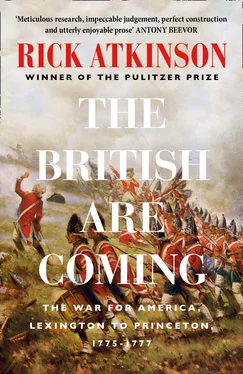At eight a.m. on November 3, a wet, blustery Friday, Montgomery’s men shouldered their firelocks in a field south of the fort. A few wore smart uniforms, like the gunners in blue coats with buff facings; more sported drab yeoman togs and slouch hats. To the trill and rap of fife and drum, the defeated garrison marched six abreast with colors flying through the gate, some of them mud-caked, their feet bound in rags. First came the 26th Foot in brick-red coats with pale yellow facings; then the Royal Fusiliers with blue facings; then Royal Artillery troops in dark blue coats and once-white waistcoats, drawing two small guns; and finally sailors in pigtails, Indians in blankets and feathers, a few kilt-clad Scots, carpenters, cooks, servants, and a gaggle of women and fretful children. At least one officer kept a locket portrait of his lover hidden under his tongue in case the Yankees began to pilfer. Major Preston strutted to the front of the American ranks. “The tears run down his cheeks,” a Connecticut soldier reported, “and he cried like a child.” On Preston’s order the troops stacked their muskets—officers kept swords and sidearms—then shuffled into the waiting bateaux for the long journey across Champlain to captivity in New England.
More than three-quarters of the British regulars in Canada had now been captured or killed, along with virtually all of the trained artillerymen. The booty from St. Johns included seventeen fine brass guns, two brass howitzers, twenty-two iron guns, eight hundred stand of small arms, sails, pitch, tar, and precious nails. The cost of the long siege to the American invaders was steep—a hundred combat casualties and another thousand men, including their commanding general, sent back to New York with various ailments. But the front door to Canada had swung open, and thousands of additional Yankees stood ready to march through.
As the last of his captives vanished up the gray Richelieu, Brigadier General Montgomery took a moment to scribble his wife a note. “If I live,” he wrote, “you may depend upon it that I will see you this winter.”
That Richard Montgomery now prepared to finish conquering Canada for the American cause was no small irony, for as a young regular officer in an earlier life he had helped to conquer it for the British Empire. The youngest son of an Irish baronet, he was commissioned as an ensign after two years of college in Dublin, then devoted sixteen years to the king’s service, half of it in North America and the West Indies. Slender and lightly pocked, he blamed “the heat and severity” of combat in Martinique and Cuba in 1762 for the loss of his hair; he blamed a girlfriend for other disorders. “She has clapped me,” he wrote a fellow officer in 1769. “The flames of my passion have subsided with those of my urine.”
An end to the French war meant an end to promotions, and in 1772, after years as a captain—including wartime service at St. Johns and Montreal—Montgomery in disgust sold his commission for £1,500. “I have of late conceived a violent passion,” he wrote a cousin. “I have cast my eyes on America, where my pride and poverty will be much more at their ease.” Packing up his volumes of Hume, Montesquieu, and Franklin’s Experiments , as well as a new microscope, surveying equipment, and draftsman’s tools, he sailed for New York and bought a seventy-acre farm just north of Manhattan. Still only thirty-four, in July 1773 he married well: Janet Livingston was the eldest daughter of a prominent New York patriot judge who owned a thirteen-thousand-acre estate in Albany County. Elected to the New York Provincial Congress when political unrest turned to rebellion, Captain Montgomery abruptly found himself appointed a brigadier general; his “air and manner designated the real soldier,” one subordinate wrote. But the honor only deepened his Irish fatalism. He told a former British comrade of a premonition that he would die “by a pistol,” and before marching north he wrote his will. “I have been dragged from obscurity much against my inclination and not without some struggle,” he told Janet, adding that as soon as he could “slip my neck out of the yoke, I will return to my family and farm.”
That yoke still held him, and the ordeal at St. Johns—“half-drowned rats crawling through the swamp,” in his description—showed Montgomery how removed the Northern Army was from disciplined proficiency, regardless of its success in capturing the fort. After one contentious conference with his subordinates, he wrote on the minutes, “I can’t help observing to how little purpose I am [here].” To his brother-in-law he denounced “the badness of the troops. The New Englanders, I am now convinced, are the worst stuff imaginable for soldiers.… The privates are all generals, but not soldiers.” New York regiments were “the sweepings of York’s streets.…’Tis no uncommon thing to see an officer beastly drunk even on duty.” Shortly before Preston’s surrender, Montgomery narrowly escaped death when a British cannonball sliced the tail from his uniform coat, knocking him to the ground. Disheartened and depressed, he contemplated resignation. “I have not the talents or temper for such a command,” he wrote Schuyler, who was still overseeing the invasion from afar. Generalship, he added, required “acting eternally out of character.”
But the command was his until his superiors decided otherwise, and now Montreal beckoned. The Northern Army plodded northwest from St. Johns toward the St. Lawrence, through “mud and mire and scarce a spot of dry ground for miles together,” a Connecticut chaplain noted. Baggage carts sank to their axles on roads corduroyed with crumbling logs. Foul weather and a shortage of boats delayed crossing the river, but on November 9 Montgomery sent an ultimatum: unless Montreal unlocked her gates, he would raze the town, leaving eight thousand residents homeless in a Canadian winter.
Built on a ridge parallel to the river’s northwestern bank, with eighteen-foot plastered stone walls described as “little more than an egg shell” and a loopholed parapet in bad repair, Montreal was built for commerce and God’s glory, not for fighting, except when drunken fur traders grew rowdy. Sometimes called Ville-Marie, the city of Mary, it was founded in the mid-seventeenth century as a shrine to the Virgin, a prayerful place of ecstasies, visions, converted Indians, and beaver pelts. River navigation ended here, and here the boundless western wilderness began. The town had become a “somewhat unsavory assemblage of merchants on the make,” a Canadian history observed. “It was no accident that New France never had a printing press.” A British officer reported that “the people throw all their dung on the ice in order that it may float away when the winter breaks up.”
By Sunday, November 12, when Montgomery reached Récollet, in the southwest suburbs, a delegation of frightened merchants agreed to his capitulation terms. On Monday morning they swung open the Récollet Gate and the Northern Army, led by two wheeled field guns, rambled into Montreal. Some wore British red coats confiscated at Chambly or St. Johns, but most were now so shabby that “a beggar in Europe would be better dressed than they were,” one priest said. Down Rue Notre-Dame the column tramped, past seminaries, dingy trapper taverns in the Rue de la Capitale, and a few fine houses of dressed gray limestone with tin roofs and green shutters. The Yankees camped in public storehouses and the citadel barracks at the north end of town. Most took it as a good sign when a marble bust of George III was decapitated by an anonymous vandal and dumped down a well in the Place d’Armes.
Rarely had a fortified town fallen so easily, yet Montgomery took little solace in the triumph. He warned Schuyler on November 13 that his troops were “exceedingly turbulent & indeed mutinous.” Only by promising that they could soon go home had he been able “to coax them to Montreal.” He was hounded by a “legion of females” pleading for British and Canadian husbands, brothers, and sons captured in the past month, while also battling his own soldiers over their confiscation of those redcoat uniforms. “There was no driving it into their noodles that the clothing was really the property of the [British] soldier, that he had paid for it,” Montgomery wrote Janet. To Schuyler he added, “I must go home.… I am weary of power.” He suggested that Schuyler come to Montreal, or that General Lee take command in Canada, or that Congress send a delegation to oversee the invasion.
Читать дальше












